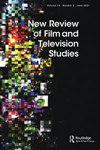惊奇、恐怖、神秘:马力克、冯·提尔和Kieślowski关于电影和宗教的信件
IF 0.3
2区 艺术学
0 FILM, RADIO, TELEVISION
引用次数: 0
摘要
未来:“20世纪80年代约翰·休斯青少年电影中的社会阶级和个人主义”是本部分和卷中的佼佼者。布尔曼的这一章受到社会学的影响,涉及美国社会的两个主要价值观,个人主义和阶级。这些主题突出地出现在休斯的青少年电影中,以及作为一个整体的类型,Bulman指出“要理解青少年电影的总体,我们必须首先理解休斯的贡献”(222)。布尔曼接着说:本文章由计算机程序翻译,如有差异,请以英文原文为准。
Wonder, horror, mystery: letters on cinema and religion in Malick, Von Trier, and Kieślowski
future:” Social Class and Individualism in the 1980s Teen Films of John Hughes,’ is a stand-out within this section and volume. Bulman’s sociologically-inflected chapter engages with two prime values within American society, individualism and class. These themes prominently surface in Hughes’ teen films, and the genre as a whole, with Bulman noting that ‘to understand teen films in general, we must first understand Hughes’s contribution’ (222). Bulman goes on to remark:
求助全文
通过发布文献求助,成功后即可免费获取论文全文。
去求助
来源期刊

New Review of Film and Television Studies
FILM, RADIO, TELEVISION-
CiteScore
0.50
自引率
0.00%
发文量
43
 求助内容:
求助内容: 应助结果提醒方式:
应助结果提醒方式:


